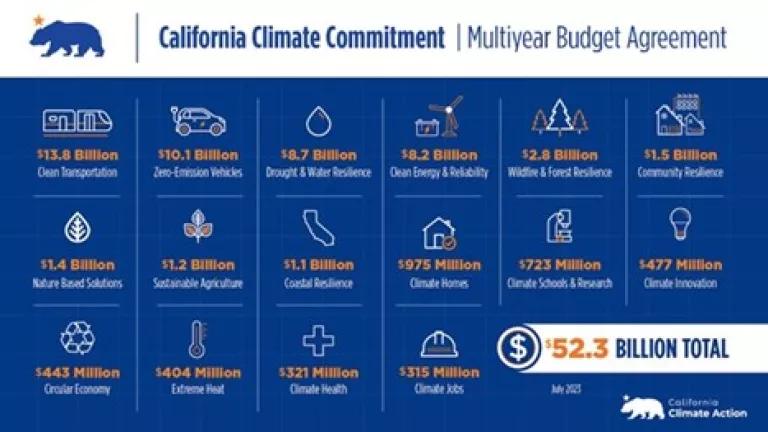
The California Public Utilities Commission took a first-in-the-nation step of eliminating customer subsidies for new gas system connections in a unanimous vote today. This decision is critical to ensuring California reaches its climate goals affordably and equitably – but the work of achieving a managed gas transition is only just beginning.
Less than a year after California Public Utilities Commission staff issued a proposal recommending an end to gas line extension subsidies, the Commission has reached a decision: starting in July 2023, new gas connections will no longer receive subsidies. This will save existing gas customers, who foot the bill for these subsidies, over $160 million annually according to the decision.
Previously, a developer seeking to connect a new property to the gas system received an “allowance” – or subsidy – to cover the upfront costs of a new connection. The subsidy is paid for by all other gas customers, including low-income customers.
The existing policy is not only inequitable – it also encourages investments into the gas system at a time when California is actively transitioning to clean, all-electric buildings to meet climate and affordability goals. Today’s decision is a critical first step in aligning gas infrastructure policy with California’s clean energy transition. But the Commission’s ambition must not stop here.
“Any new gas infrastructure is likely to become a stranded asset”
This decision is premised on a simple fact about California’s energy future. As the Commission writes on page 16 of the decision, “Any new gas infrastructure is likely to become a stranded asset.” Low-income customers – who are least able to afford to transition to electric appliances without assistance – are most likely to be left paying for these “stranded” costs as other better-resourced customers depart the gas system, unless proactive steps are taken to avoid this outcome.
California is not the only state reaching this conclusion. The Colorado Public Utilities Commission is also poised to adopt a proposed rule change that would eliminate gas line extension allowances. To achieve an equitable and affordable clean energy transition, regulators and legislators in California and beyond must limit new gas investments that are likely to be stranded.
Benefits of today’s decision
Today’s decision is a win for equity and energy affordability. But, as the Commission notes, the benefits do not stop there. Ending gas line extension subsidies will:
- Protect consumers from the rapidly rising costs of gas, which are projected to escalate as consumption declines and fixed infrastructure costs like pipeline maintenance need to be paid by customers who remain on the gas system.
- Reduce gas rates by saving gas utility customers over $160 million per year.
- Advance climate action by reducing greenhouse gas emissions.
- Improve quality of life and health for customers due to a reduction in polluting appliances, such as gas stoves, within homes.
- Reduce or eliminate negative environmental impacts of gas system expansion, including land use impacts, wildlife impacts, and impacts on water use and water quality.
- Provide certainty for builders, developers, contractors, and individual customers regarding California’s energy transition.
Notably, the proposed decision would deliver these benefits without significantly impacting construction prices. It simply sends a much-needed market signal regarding California’s transition to all-electric buildings by removing the subsidy to build with gas.
What’s Next?
As the Commission noted in today’s decision, any new gas infrastructure is likely to be underutilized as California transitions to all-electric buildings. And low-income customers – who may be least able to transition to electric appliances without support – are most likely to be left stranded on a polluting and expensive system. Therefore, limiting new, unnecessary gas investments is an urgent task. Today’s decision removes the subsidy for new properties to connect to the gas system, but the Commission must take further action to ensure that all unnecessary gas investments are avoided and that all customers, regardless of income or rental status, can be part of the clean energy transition.
There are many open policy questions about how to achieve this transition. We urge the Commission to follow the lead of the Colorado Public Utilities Commission in embarking on a comprehensive gas planning process, by ramping up the ambition and timeline in the CPUC’s own Long-Term Gas Planning proceeding. This process should provide a blueprint for evaluating new gas infrastructure proposals, outline a pathway to an equitable contraction of the existing system, and establish rule changes to effectuate a managed, cost-effective transition.
The Legislature may also have a role to play: gas utilities have an “obligation to serve” customers and this could be interpreted as continuing to serve gas to those customers who currently use gas, even when there are clean and affordable options to provide the same energy service (e.g. heating and cooking) with renewable electricity. The Legislature can put that legal question to rest by adopting legislation that enables utilities to meet their “obligation to serve” with either electricity or gas service.
Transitioning from the gas system of the past to the clean energy system of the future will no doubt be a heavy lift. But limiting new gas investments today is essential to making sure that gas system contraction is more feasible, equitable, and affordable going forward. Ending subsidies for new connections is an important first step – but the long road to achieving a managed gas transition is only just beginning.





